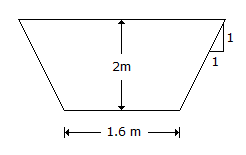Civil Engineering :: Waste Water Engineering
-
The pH value of fresh sewage is usually
-
The moisture content of a sludge is reduced from 90% to 80% in a sludge digestion tank. The percentage decrease in the volume of sludge, is
-
Inter-distance between ventilation columns in a sewer line is kept
-
If q is the average sewage flow from a city of population P, the maximum sewage flow
-
The factor responsible for purification of sewage in river is
-
If the peak discharge of a storm water drain (S.W. Drain) is e.xpected to exceed 150 cumecs, the free board to be provided, is
-
PH value of sludge during alkaline regression stage, is
-
Depletion of ozone layer in the outer atmosphere may cause
-
The spacing of bars of perforations of fine screens used for the treatment of sewage, is
-
The self-cleansing velocity of water flowing through pipe lines, is
-
Ventilating shafts are provided to a sewer line at every
-
Which one of the following part of human body withstands minimum radiation
-
The water carried sewerage system removes
-
The sludge does not contain waste water from
-
If the depth of flow in a circular sewer is 1/4th of its diameter D, the wetted perimeter is
-
Design period of 40 to 50 years is adopted for
-
The pH value of sewage is determined with the help of
-
Lead caulked joints are used for laying
-
Pick up the correct statement from the following :
-
For trunk sewers more than 1.25 m in diameter, the ratio of the maximum daily sewage flow to the average daily sewage flow is assumed
-
At the junction of sewers
-
Primary treatment of sewage consists of removal of
-
The rainfall at any place may be determined by
-
In trickling filter, B.O.D. is reduced to
-
Which one of the following gases is most significant as air pollutant
-
Which one of the following statements regarding septic tanks is wrong :
-
In circular sewers if depth of flow is 0.2 times the full depth, the nominal gradient,
-
The maximum spacing of manholes specified by Indian standard in sewers upto 0.3 m diameter is
-
. The Chezy's constant C in the formula V = C \(\sqrt{rs}\) depends upon
-
Afive day B.O.D. at 15°C of the sewage of a town is 100 kg/day. If the 5 day B.O.D. per head at 15°C for standard sewage is 0.1 kg/day, the population equivalent is
-
The density of population over 40 hectares is 250/hectare. If water supply demand per day is 200 litres and sewage discharge is 80% of water supply, the sewage flow in sewers of separate system, is
-
. For the open drain (N = 0.025) shown in the below figure, the discharge is

-
If the diameter of a sewer is 150 mm, the gradient required for generating self cleansing velocity, is
-
The most widely used pump for lifting sewage is
-
The sewer which resists sulphide corrosion, is
-
For large sewers, maximum distance between manholes may be
-
The first stage of neutral process of sludge digestion, is
-
. Lead acetate test in sewer manhole is done to test the presence of
-
Dried sewage after treatment is used as
-
The use of coarse screens for the disposal of sewage, may be dispensed with by
-
Sewer pipes are designed for maximum discharge with 25% to 33% vacant cross-sectional area for
-
5 days-biochemical oxygen demand (BOD5) is taken at a temperature of
-
Imhoff cone is used to measure
-
For a grit chamber, if the recommended velocity of flow is 0.2 m/sec and detention period is 2 minutes, the length of the tank, is


 Whatsapp
Whatsapp
 Facebook
Facebook

